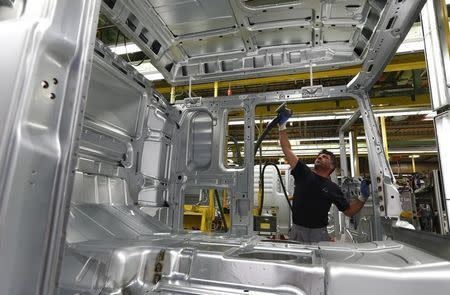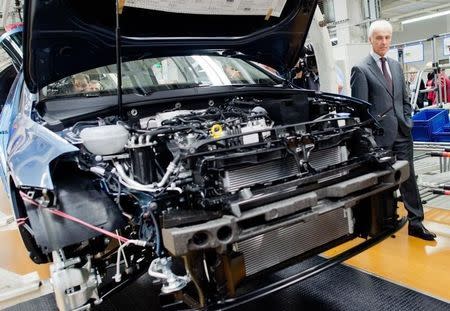German business takes Volkswagen scandal in stride
BERLIN (Reuters) - German business morale fell slightly in October, suggesting Europe's largest economy remains resilient in the face of a slowdown in emerging markets and the emissions scandal that has rocked its largest carmaker Volkswagen .
The Munich-based Ifo economic institute's business climate index, based on a monthly survey of some 7,000 firms, dipped to 108.2 in October from 108.5 in September, a better reading than the 107.8 forecast by economists in a Reuters poll.
A separate index measuring corporate expectations over a half-year horizon pushed up to a seven-month high of 103.8, suggesting many firms believe they can cope with the economic headwinds.
"The German economy is proving remarkably resilient in view of this autumn's multiple challenges," Ifo head Hans-Werner Sinn said in a statement.
"Indeed the Volkswagen scandal has had no impact on the German automotive industry. The climate index for the automotive sector even continued to rise this month."
The German economy has been sending out mixed signals in recent months, with industrial orders, output and exports all slumping in the month of August, according to data released earlier this month.
Two weeks ago, the closely-watched ZEW survey of analysts and investors tumbled to its lowest level in a year, suggesting to some that the VW scandal could have a significant impact on the economy.
But the Ifo numbers will ease those concerns. Although the Ifo index of current conditions dipped to a seven-month low of 112.6, the rise in expectations suggested that most firms are not too worried about the Volkswagen crisis, in which the company has admitted to rigging diesel emissions tests.
"One should not interpret too much in a single confidence indicator but today's Ifo reading suggests that the German business community is filing the Volkswagen scandal as a one-off and also shrugs off the risk from a possible Chinese and emerging markets slowdown," said Carsten Brzeski of ING.
Ifo economist Klaus Wohlrabe told Reuters that neither the influx of hundreds of thousands of refugees into Germany, nor the loose policies of the European Central Bank and U.S. Federal Reserve, seemed to be having a substantial effect on morale.
(Reporting by Michelle Martin, Tina Bellon and Joern Poltz; Writing by Noah Barkin; Editing by Catherine Evans)





